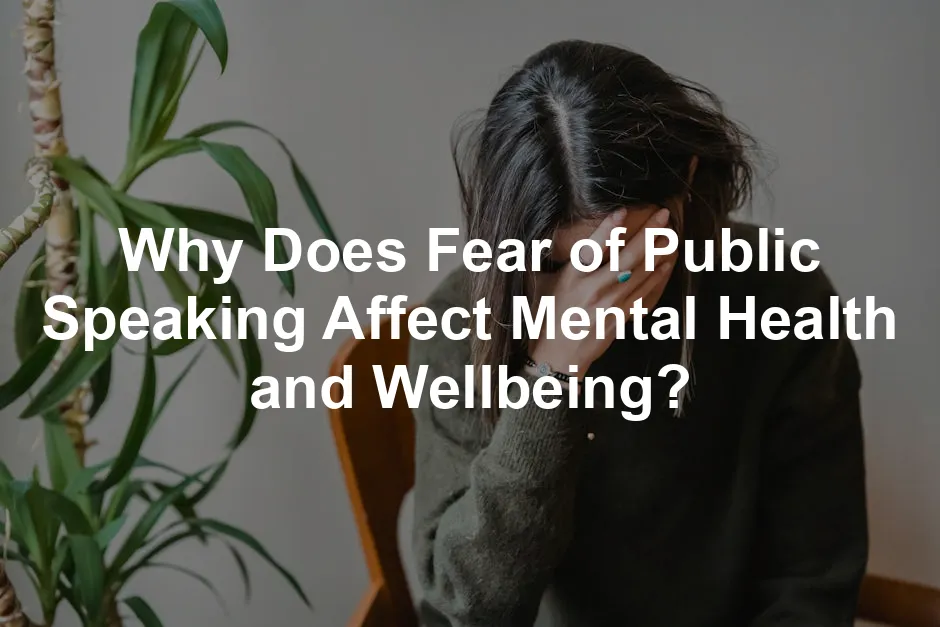
Why Does Fear of Public Speaking Affect Mental Health and Wellbeing?
Introduction
In the grand theater of life, few stages induce terror quite like the one spotlighted by public speaking. Glossophobia, the fear of public speaking, is a common phenomenon that leaves many trembling at the thought of addressing an audience. It’s ironic, really: we often celebrate eloquence and confidence while silently battling the panic that accompanies the microphone.
This fear is more than just a case of nerves; it can spiral into a significant mental health concern. About 40% of people experience severe anxiety when faced with public speaking, leading to avoidance behaviors that can hinder personal and professional growth. The roots of this fear often stem from a fear of judgment, a feeling that can manifest in both psychological and physical symptoms.
When faced with the prospect of speaking in front of others, individuals can experience increased heart rates, perspiration, and even a sense of impending doom. This anxiety can be so overwhelming that it leads to avoidance of situations where public speaking may arise, such as job opportunities, social gatherings, or academic presentations.

To help conquer this fear, consider diving into “Talk Like TED: The 9 Public-Speaking Secrets of the World’s Top Minds” by Carmine Gallo. This book reveals techniques used by the best speakers to engage and captivate their audiences. After all, if you’re going to face your fears, you might as well learn from the pros!
The consequences extend beyond the immediate discomfort. The psychological impact can lead to a decline in self-esteem and an increase in feelings of inadequacy. When individuals avoid public speaking, they miss out on opportunities to express their thoughts and ideas, leading to frustration and a sense of isolation.
Moreover, the physiological responses to fear—shaking, sweating, or even nausea—can become a vicious cycle. The more one fears speaking, the more these symptoms appear, reinforcing the belief that public speaking is a daunting task.
However, understanding the fear is the first step toward overcoming it. By addressing why this fear is so pervasive and its effects on mental health, we can empower individuals to reclaim their voices and enhance their overall wellbeing. Strategies for overcoming public speaking anxiety will be explored throughout this article, allowing individuals to transform this fear into a strength rather than a limitation.
Understanding the fear of public speaking, also known as glossophobia, is essential for improving mental health and overcoming anxiety.
Through preparation, practice, and support, anyone can learn to navigate the once-terrifying waters of public speaking. Embracing these strategies can lead not only to improved speaking skills but also to heightened confidence and enhanced mental health. Reclaiming the stage is not just about conquering fear; it’s about discovering the power of one’s voice in the world.
Summary of Key Points
Fear of public speaking is not just about stage fright; it intertwines with deeper psychological issues and can have lasting effects on mental health and wellbeing. Approximately 40% of people experience significant anxiety when faced with public speaking, leading to avoidance behaviors that can hinder personal and professional growth. This fear often stems from a fear of judgment and can manifest in various physiological symptoms such as increased heart rate, sweating, and trembling.
The paper will explore the psychological roots of this fear, its consequences on mental health, and offer practical strategies for overcoming it. By addressing these concerns, we can empower individuals to reclaim their voices and enhance their overall wellbeing. Understanding that fear is a natural response and recognizing the tools available to confront it can lead to a more fulfilling and expressive life.
Understanding the Fear of Public Speaking
What is Glossophobia?
Glossophobia is the intense fear of public speaking. This fear affects about 40% of people at some point in their lives. Surprisingly, this makes it more common than a fear of spiders, heights, or even death! Unlike typical anxiety, glossophobia often leads to avoidance behavior. Those who suffer might skip job interviews or miss important social events just to dodge speaking in front of others.
So, what distinguishes glossophobia from normal anxiety? Normal anxiety might lead to a slight flutter in the stomach before a speech, but glossophobia can trigger a full-blown panic attack. Individuals may experience trembling, sweating, or even nausea when faced with the prospect of public speaking. Situations that can trigger this fear include:
- Giving a presentation at work
- Speaking in front of a classroom
- Toasting at a wedding
- Addressing a community gathering
These scenarios can feel like a ticking time bomb for someone battling glossophobia.
Psychological Roots of Public Speaking Anxiety
The origins of public speaking anxiety can be traced back through various psychological theories. Evolutionary psychology suggests that our ancestors faced threats in social settings. Being part of a group was crucial for survival. Thus, the fear of judgment and rejection can evoke primal fears of being ostracized.
Internal factors play a significant role in amplifying this fear. Self-perception is crucial; if someone believes they’re inadequate, the anxiety spikes. Negative beliefs, such as thinking, “I’ll embarrass myself,” can create a mental barrier. These thoughts often spiral into a vicious cycle, making the fear seem insurmountable.
External factors also influence this anxiety. The size of the audience can be daunting; the larger the group, the more intense the fear can become. Context matters too—speaking at a formal event versus a casual gathering can elicit different levels of anxiety. The stakes feel higher in professional settings, where the fear of negative evaluation looms large.
Understanding these psychological roots can empower individuals to tackle their fears head-on. By recognizing that this fear is a common struggle, people can begin to navigate their way through the maze of public speaking anxiety.
The Impact of Fear of Public Speaking on Mental Health
Psychological Effects
Fear of public speaking can unleash a cocktail of anxiety and stress. For many, the thought of addressing an audience triggers a wave of panic. The fear isn’t just about speaking—it’s about the potential judgment from others. This constant worry can push some individuals toward developing social anxiety disorder. Imagine feeling like everyone is staring, waiting for you to stumble; that’s the reality for many.
Moreover, this fear often intertwines with feelings of inadequacy. It’s not uncommon to feel less competent compared to peers. Each missed opportunity to speak can deepen these feelings, creating a spiral of low self-esteem. When one believes they will fail in public speaking, their self-worth takes a hit. The result? A cycle of avoidance and self-doubt that can be hard to escape.

Physical Symptoms
Public speaking anxiety manifests in various physical symptoms. Ever felt your palms sweating or your heart racing before a presentation? These physiological responses can be overwhelming. Some individuals may tremble uncontrollably or even feel nauseous. Such symptoms not only heighten anxiety but can lead to full-blown panic attacks.
Statistics reveal that nearly 75% of people experience physical symptoms while speaking publicly. This intense anxiety can interfere with daily life, causing individuals to avoid situations where they might have to speak. The fear of embarrassment often outweighs the desire to engage, leading to missed opportunities in both personal and professional realms.
Long-term Consequences
The long-term consequences of public speaking anxiety can be profound. Avoidance behaviors might lead to strained personal relationships. When someone is too anxious to share their thoughts, they risk isolating themselves. This isolation can further impact mental health, leading to feelings of loneliness and despair.
In professional settings, the stakes are even higher. Fear of speaking can hinder career advancement. Individuals might shy away from job opportunities that involve presentations or leadership roles. This avoidance can stifle professional growth and limit potential career trajectories.
Over time, untreated public speaking anxiety can escalate into more severe mental health issues. The ongoing stress and avoidance can contribute to conditions like depression or generalized anxiety disorder. Recognizing and addressing the fear of public speaking is crucial for maintaining mental health and overall wellbeing. By confronting this fear, individuals can reclaim their confidence and open doors to new opportunities.
Strategies to Overcome Public Speaking Anxiety
Public speaking anxiety is a common hurdle for many. Luckily, there are effective strategies to conquer this fear. Let’s dive into some tried-and-true techniques that can help you transform your anxiety into confidence.

Preparation Techniques
First and foremost, thorough preparation is key. Preparing a well-structured speech helps alleviate anxiety. You want to feel like a rock star, not a deer caught in headlights. Think of your speech as your performance. Here are some tips to create effective speeches:
- Know Your Audience: Tailor your speech to resonate with them. Understanding their interests can guide your content.
- Craft a Clear Structure: Start with an engaging introduction, followed by your main points, and finish with a strong conclusion. A clear roadmap keeps you organized.
- Practice, Practice, Practice: Rehearse your speech multiple times. You want to be so familiar with it that you can deliver it in your sleep. Consider practicing in front of a mirror or recording yourself. This will help you fine-tune your delivery.
- Use Visual Aids: Incorporate slides or props to support your message. They can serve as prompts while also engaging your audience.
- Familiarity is Comfort: The more familiar you are with your material, the less anxious you’ll feel. It’s like being the star of the show—know your lines!
If you’re looking for additional guidance, check out “The Quick and Easy Way to Effective Speaking” by Dale Carnegie. This classic offers timeless techniques that can help you craft your message and deliver it with confidence.
Cognitive Behavioral Techniques
Cognitive Behavioral Therapy (CBT) is a fabulous tool for tackling public speaking anxiety. It helps to reframing negative thoughts. Here’s how to implement it:
- Identify Negative Thoughts: Recognize those pesky thoughts that trigger anxiety. “What if I mess up?” is a common one.
- Challenge These Thoughts: Ask yourself, “Is this thought realistic?” Most likely, the answer is no! Replace it with a positive affirmation like, “I’m prepared and capable.”
- Practice Visualization: Picture yourself speaking confidently in front of an audience. Visualizing success can pave the way for actual success. Imagine the applause; it’s a game-changer!
To further enhance your skills, consider reading “Confessions of a Public Speaker” by Scott Berkun. This book provides real-life insights into the trials and triumphs of public speaking, helping you understand that even the pros have their moments!
Exposure and Desensitization
Gradual exposure to public speaking situations can significantly reduce anxiety. Remember, you’re not diving into the deep end right away. Start small and build your confidence:
- Begin with Small Groups: Practice speaking in front of friends or family first. Their supportive reactions will boost your confidence.
- Join Support Groups: Organizations like Toastmasters provide a friendly environment to practice. Sharing the stage with others who feel the same way can be reassuring.
- Increase Your Audience Size Gradually: Once you feel comfortable, start speaking in front of larger groups. Each successful experience builds your confidence.
And if you’re looking for a practical tool to help you practice, consider a Public Speaking Practice Book. It’s a great way to hone your skills in a structured manner!
Relaxation Techniques
Finally, relaxation techniques can calm those jittery nerves. Here are a few methods to consider:
- Deep Breathing Exercises: Before your speech, take a few slow, deep breaths. Inhale for four counts, hold for four, and exhale for four. This simple practice can ground you.
- Mindfulness and Meditation: Regular mindfulness practices can help reduce anxiety over time. Consider integrating meditation into your daily routine.
- Physical Exercise: Regular physical activity can significantly lower anxiety levels. Whether it’s a brisk walk or a dance party in your living room, get moving!
If you’re seeking a bit of calm, try an A Mindfulness Meditation App. It can help you cultivate peace of mind and focus.

By employing these strategies, you can effectively manage public speaking anxiety. The journey may seem daunting, but with practice and the right techniques, you’ll be well on your way to becoming a confident public speaker. Remember, every expert was once a beginner. So, take a deep breath, prepare, and step into the spotlight with a smile!
Conclusion
Fear of public speaking is more than just nerves—it’s a significant barrier that impacts mental health and overall wellbeing. Known as glossophobia, this fear grips about 40% of the population, leading to a myriad of psychological and physiological consequences. Individuals may experience anxiety, panic attacks, and even avoidance behaviors that can hinder their personal and professional lives.
Understanding the roots of this fear is essential. It often stems from a fear of judgment or negative evaluation. This feeling can lead to a cycle of self-doubt, where individuals believe they’ll embarrass themselves in front of an audience. Unfortunately, such thoughts can become self-fulfilling prophecies, reinforcing the fear and leading to further avoidance.
However, fear doesn’t have to be a permanent fixture. By embracing public speaking as a valuable skill rather than a daunting challenge, individuals can unlock new opportunities. Imagine transforming a source of anxiety into a platform for growth! With the right strategies, such as preparation, cognitive restructuring, and gradual exposure, it’s possible to reclaim your voice.

Professional growth often hinges on effective communication. By tackling public speaking anxiety head-on, individuals can open doors to leadership roles, networking opportunities, and social connections. The journey may be challenging, but the rewards are worth it. Enhanced self-esteem and mental health await those who dare to confront their fears.
In conclusion, fear of public speaking can affect mental health, but it doesn’t have to dictate your life. By acknowledging the fear and implementing effective strategies, you can transform this anxiety into a tool for personal and professional success. So, take that microphone, step into the spotlight, and showcase your unique voice to the world!
FAQs
What are the common symptoms of public speaking anxiety?
Public speaking anxiety can manifest through both psychological and physical symptoms. Psychologically, individuals may experience intense worry, fear of judgment, and feelings of dread before speaking. They might also find themselves obsessively focusing on potential mistakes or negative evaluations. Physically, symptoms can range from increased heart rate and sweating to trembling and even nausea. The key is recognizing the difference between mild anxiety and glossophobia. While mild anxiety might cause slight nervousness, glossophobia can lead to debilitating fear that interferes with daily life.
Can public speaking anxiety be completely eliminated?
While it might be tempting to seek complete eradication of public speaking anxiety, the reality is more nuanced. Many individuals find that they can manage their anxiety effectively but not necessarily eliminate it. Ongoing practice, exposure to speaking situations, and coping strategies are crucial for managing anxiety. Embracing the concept that feeling anxious is normal can also be liberating. With time and experience, many individuals report feeling more comfortable and confident in public speaking situations.
How does public speaking anxiety relate to social anxiety disorder?
Public speaking anxiety and social anxiety disorder are closely linked but not synonymous. Social anxiety disorder encompasses a broader fear of social situations, while public speaking anxiety specifically pertains to speaking in front of an audience. Interestingly, some people may experience performance-only social anxiety, where their anxiety is triggered solely by public speaking scenarios. Understanding this distinction can help individuals identify their specific fears and tailor their coping strategies accordingly.
Are there specific therapies recommended for overcoming this fear?
Yes, several therapeutic approaches are effective for addressing public speaking anxiety. Cognitive Behavioral Therapy (CBT) is particularly beneficial, as it helps individuals reframe negative thoughts and beliefs associated with public speaking. Exposure therapy is another effective method, gradually desensitizing individuals to the anxiety-provoking situation. Seeking professional help can be instrumental in developing a personalized strategy to tackle public speaking anxiety.
What resources are available for individuals struggling with public speaking anxiety?
Numerous resources exist for those grappling with public speaking anxiety. Support groups and online forums provide a space to share experiences and strategies. Books on public speaking techniques can offer valuable insights. Organizations like Toastmasters International are also excellent resources, providing a supportive environment for individuals to practice speaking skills. Remember, you’re not alone in this journey. With the right tools and support, you can overcome public speaking anxiety and thrive!
Please let us know what you think about our content by leaving a comment down below!
Thank you for reading till here 🙂
All images from Pexels




